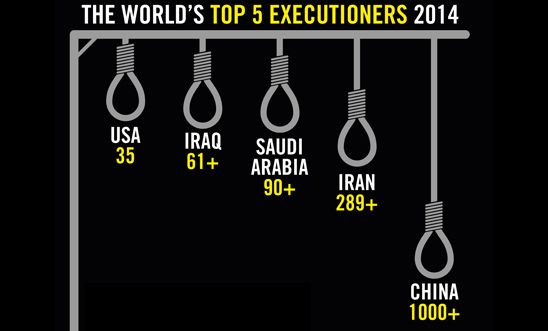
An execution every two days: Saudi Arabia’s surge in killings

An arbitrary arrest. No legal representation. A false ‘confession’. A flawed trial. No real right to appeal. And then – a beheading.
In the first six months of 2015, Saudi Arabia executed 102 people – more than in all of 2014. In many cases the death penalty has been used after a deeply-flawed process, with unfair trials and ‘evidence’ gained through torture.
Despite this, the Saudi Arabian authorities continue to claim they only use the death penalty for the ‘most serious crimes’, and only after thorough judicial proceedings.
Reality contradicts their claims at every point.
Vague laws mean guilt doesn’t need to be ’beyond reasonable doubt’
Saudi Arabia’s Shari’a law-based justice system lacks a criminal code – leaving definitions of many crimes, and their punishments, open to the interpretation of individual judges. In some cases, mere suspicion of being guilty is enough for a judge to invoke the death penalty. This can be based on the character of the defendant or severity of the alleged crime.
These discretionary punishments are known as ta’zir. Crimes that wouldn’t be considered serious enough to allow the death penalty under international law – such as drugs offences and armed robbery – all fall under this group of ta’zir crimes, as do the ‘crimes’ of adultery, apostasy, witchcraft and sorcery. So far this year, nearly half of executions have been for drugs offences.
‘Terrorist crimes’ can also carry the death penalty. These include ‘calling for, participating in, publicising, or inciting protests, demonstrations, gatherings or group petitions’ and ‘calling for atheist thought’.
Sheikh Nimr Baqir al-Nimr
Nimr al-Nimir – an Imam in eastern Saudi Arabia and a vocal critic of the authorities’ treatment of Shi’a muslims – was sentenced to death on 15 October 2014. He had been convicted of ‘inciting against national unity’, ‘supporting riots’ and ‘questioning the judiciary’, amongst others.
Before his trial he was regularly refused access to his lawyer and even to a pen and paper. His lawyer was forced to sign a pledge that he would not share court documents or speak to the media. Meanwhile media outlets controlled by the state carried out a smear campaign against the cleric.
The judge also allowed the arresting officers to not testify at the trial – removing any chance of Nimr al-Nimr’s lawyer being able to question their accounts and their claims he fired at them to avoid arrest.
A violent and public death
Most executions are carried out by beheading – Saudi Arabia is the only country in the world to use the method. In some cases executions are carried out in public, and the bodies put on display.
The authorities often refuse to notify the family of a prisoner, or the prisoner themselves, that the execution is imminent. Many loved ones only learn about an execution after the fact, sometimes through reports on the media.
Flawed trials without lawyers
Despite the Saudi authorities’ claim that the death penalty is used only after ‘thorough judicial proceedings’, the reality doesn’t seem to match. Saudi law requires anyone accused of a crime to have access to a lawyer during the investigation and the trial. But, crucially, it doesn’t require anyone arrested to be told that – leading to deception, misuse of the law and forced confessions.
In death penalty cases we investigated, defendants told us they’d been refused lawyers without any explanation, been told that a lawyer would ‘complicate matters’, or that they could only have one at trial.
Siti Zainab Binti Durhi Rupa
Zainab, an Indonesian domestic worker, was sentenced to death in 1999 for the murder of her employer – an employer who allegedly mistreated her since hiring her the year before.
During her arrest and trial, Zainab never had access to a lawyer, or saw anyone from the Indonesian Embassy. Her ‘confession’ under police interrogation was witnessed by no one but the officers involved.
According to reports, police suspected Zainab had a severe mental disability, but this was never taken into account, and Zainab was executed in April.
What we’re calling for
Saudi Arabia’s use of the death penalty breaks international law and international standards on fair trials. We continue to call on the authorities to halt all use of the death penalty. In the meantime, Saudi Arabia should also:
- Stop using the death penalty for crimes that are not considered ‘most serious’ under international law.
- Stop using the death penalty for those under the age of 18 at the time of their crime, as required under Saudi Arabia’s signature of the Convention of the Rights of the Child.
- Ensure all detainees are informed of, and granted their rights from the time they are arrested – including access to a lawyer, and if appropriate access to consular officials and interpretation services.
Find out more
Why Amnesty works on the death penalty
The death penalty in 2014
Free Raif Badawi